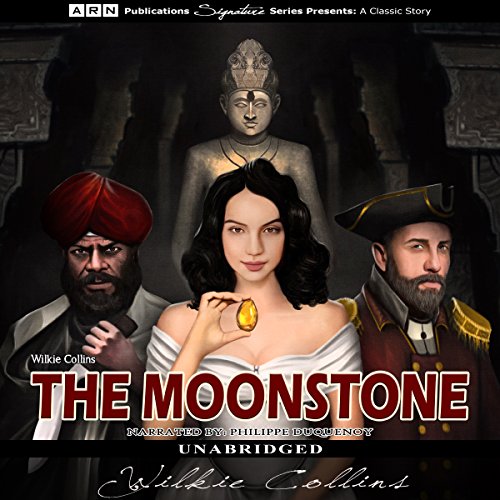-
The Moonstone
Wilkie Collins, Joan De Fraine, John Sargeant, Grace Hogarth
Hardcover (American Education, )None
-
The Moonstone
Wilkie Collins
Hardcover (Kessinger Publishing, LLC, Sept. 10, 2010)This scarce antiquarian book is a facsimile reprint of the original. Due to its age, it may contain imperfections such as marks, notations, marginalia and flawed pages. Because we believe this work is culturally important, we have made it available as part of our commitment for protecting, preserving, and promoting the world's literature in affordable, high quality, modern editions that are true to the original work.
-
The Moonstone
W Collins
Paperback (Penguin Books, March 15, 1960)None
-
The Moonstone
Au Wilkie Collins
Hardcover (ISIS Large Print Books, Aug. 1, 1992)Rachel Verinder inherits a mystical yellow diamond sought after by a group of Hindu priests who have waited for centuries to reclaim their ancient talisman.
-
The Moonstone
Wilkie Collins
Hardcover (HarperCollins Distribution Services, )None
-
The Moonstone
Wilkie Collins
Mass Market Paperback (Signet Classics, March 1, 1984)None
-
The Moonstone
Wilkie Collins
Abridged Edition (Naxos Audio Books, Feb. 1, 1995)When Rachel Verinder inherits the Moonstone, a huge and priceless diamond, her delight turns to dismay when the gem disappears. 3 cassettes.
-
The Moonstone
Wilkie Collins
Mass Market Paperback (Pyramid, Jan. 1, 1950)Abridged.
-
The Moonstone
Wilkie Collins
Audio Cassette (Recorded Books, June 1, 1989)None
-
The Moonstone
Wilkie Collins, Philippe Duquenoy, A.R.N. Publications
Audiobook (A.R.N. Publications, July 7, 2016)The Moonstone by Wilkie Collins begins with Mr. John Herncastle stealing a mysterious yellow diamond from the statue of a sacred Indian god while fighting with the British army in India. The diamond makes it way to back England after John Herncastle returns from his tour with the British army. The sacred diamond is bestowed to a young woman, Rachel Verinder, a relative of John Herncastle, on her 18th birthday. The man charged with transporting the diamond quickly suspects that something is amiss when he notices Indian men following him in London and at the Verinder estate. On the eve of her birthday, Rachel wears the diamond to dinner where she is proposed to by her cousin, but ends up refusing him, as she is in love with someone else. That very night, the diamond is stolen once again and things begin to quickly escalate as people are accused of its theft, and those being accused begin to die. Rachel starts to act very strangely and the household is moved to London until the investigation is over. The novel shifts between various people's point of view in an attempt to piece together the mystery of "who done it?" Bits and pieces of the story start to come to light and the plot twists and turns in unexpected ways until the mystery is finally solved.
-
THE MOONSTONE
Wilkie Collins
Mass Market Paperback (Pyramid Giant, Jan. 1, 1953)None
-
The Moonstone
Wilkie Collins
2019 (IDB Productions, Jan. 1, 2019)The Moonstone FIRST PERIOD THE LOSS OF THE DIAMOND (1848) The events related by GABRIEL BETTEREDGE, house-steward in the service of JULIA, LADY VERINDER. CHAPTER I In the first part of ROBINSON CRUSOE, at page one hundred and twenty-nine, you will find it thus written: “Now I saw, though too late, the Folly of beginning a Work before we count the Cost, and before we judge rightly of our own Strength to go through with it.” Only yesterday, I opened my ROBINSON CRUSOE at that place. Only this morning (May twenty-first, Eighteen hundred and fifty), came my lady’s nephew, Mr. Franklin Blake, and held a short conversation with me, as follows:— “Betteredge,” says Mr. Franklin, “I have been to the lawyer’s about some family matters; and, among other things, we have been talking of the loss of the Indian Diamond, in my aunt’s house in Yorkshire, two years since. Mr. Bruff thinks as I think, that the whole story ought, in the interests of truth, to be placed on record in writing—and the sooner the better.” Not perceiving his drift yet, and thinking it always desirable for the sake of peace and quietness to be on the lawyer’s side, I said I thought so too. Mr. Franklin went on. “In this matter of the Diamond,” he said, “the characters of innocent people have suffered under suspicion already—as you know. The memories of innocent people may suffer, hereafter, for want of a record of the facts to which those who come after us can appeal. There can be no doubt that this strange family story of ours ought to be told. And I think, Betteredge, Mr. Bruff and I together have hit on the right way of telling it.” Very satisfactory to both of them, no doubt. But I failed to see what I myself had to do with it, so far.